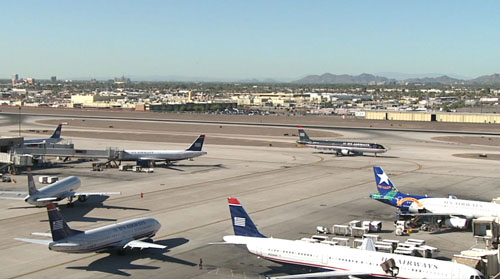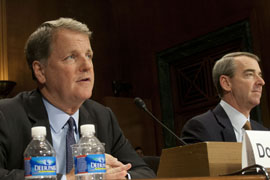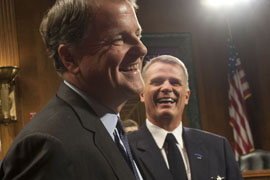Cronkite News has moved to a new home at cronkitenews.azpbs.org. Use this site to search archives from 2011 to May 2015. You can search the new site for current stories.
Airline CEOs assure senators merger will benefit consumers
WASHINGTON – The CEOs of American Airlines and US Airways told a Senate Judiciary subcommittee Tuesday that not only would a merger of their airlines not hurt Phoenix, it could bring more international flights to the city.
US Airways CEO Doug Parker compared the benefits of this merger to the 2005 joining of his airline and America West.
“We gave the people of Arizona the opportunity to fly more places, this merger is going to do that yet again,” Parker said.
It was one of several state-specific promises to senators from Parker and American Airlines CEO Thomas Horton, who said the $11 billion merger, creating the nation’s biggest airline, would not hurt consumers or communities.
The two men said the new firm, to be called American Airlines, would maintain service to Yuma and Flagstaff and would keep a strong corporate presence in Tempe, where US Airways is now headquartered. The airline has previously said it will continue to employ about 9,000 people in Arizona.
“We love Arizona and it’s important to us,” Parker said.
But Consumers Union consultant William McGee questioned the likelihood of maintaining a hub in Phoenix by a newly merged airline with hubs nearby in Dallas and Los Angeles.
“We’re concerned about the future of US Airways hubs – Philadelphia Charlotte (N.C.) and Phoenix,” McGee said.
If the merger is approved, the new airline would be headquartered in Dallas-Fort Worth, which officials concede will mean the loss of some corporate positions in Tempe.
Sen. Jeff Flake, R-Ariz., jokingly lamented the airlines’ decision to set up headquarters in Texas.
“All of us experienced, you know in elementary school when your best friend moves away, this time to Dallas, with all these promises that they will write or visit,” Flake said. “The thing is, I was never able to … to put our friends under oath.”
The deal needs to be approved by the court overseeing American Airlines’ bankruptcy, which is scheduled to rule March 27, and it must be reviewed by the Justice Department and the European Union for antitrust compliance.
The new airline will also have to negotiate with labor unions. While American Airlines pilots and flight attendants have expressed support for the merger, the union for US Airways flight attendants has yet to reach agreement with management.
Deborah Volpe, president of the Association of Flight Attendants union local in Phoenix, said she is concerned that US Airways contracts would be pushed aside in favor of American Airlines contracts.
“We’re seeing some signs that may happen and we’re hoping to head that off,” said Volpe, who hopes for an agreement with management that would lead to equal wages once the merger is complete.
The size of the merged airline raised concerns for Sen. Amy Klobuchar, D-Minn., who said she would ask the Government Accountability Office to investigate the impact of the deal on consumers.
“We have to get answers for the people of this country,” said Klobuchar, chairwoman of the Subcommittee on Antitrust, Competition Policy and Consumer Rights that held Tuesday’s hearing.
Since 2005, six airline mergers have been approved. The American/US Airways deal would leave four airlines in control of more than 70 percent of the market, according to a study by the American Antitrust Institute and the Business Travel Coalition.
But the CEOs Tuesday said this latest merger would create 1,300 new connecting routes to many small and mid-sized cities and give the new company the ability to compete globally.
American Antitrust Institute Director Diana Moss said the goal of being able to compete globally was understandable, but it might sacrifice service within the U.S. She criticized the individual promises to senators and called for straightforward application of antitrust law to protect consumers nationwide.
“We do see some very negative trade-off effects,” Moss said.










